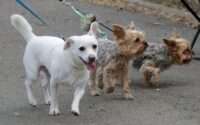What Does It Mean When an Older Dog Starts Drinking a Lot of Water? Understanding the Signs
Welcome to BarkLikeMeow’s guide on understanding the ins and outs of your beloved senior pup’s water habits. As our faithful companions age, we embark on a journey filled with love, loyalty, and sometimes, a few unexpected changes. One such change that may catch your attention is an increase in water consumption. But fret not, dear pet parent, for we’re here to shed light on this topic and provide you with the knowledge you need to navigate your senior dog’s health journey with confidence.
The Basics: Normal Water Consumption in Dogs
Ah, the age-old question: “How much water should my dog be drinking?” It’s a query that often swirls in the minds of pet parents, especially as our furry friends grow older. Let’s dive into the fundamentals to help you understand what’s typical for your senior canine companion.
How Much Water Should a Dog Drink a Day?
Just like us humans, dogs rely on water to keep their bodies functioning optimally. On average, a healthy adult dog should consume about one ounce of water per pound of body weight per day. However, this can vary based on factors such as size, breed, activity level, and environmental conditions.
Factors Influencing Water Intake in Canines
- Size and Breed Considerations: It’s no secret that Great Danes and Chihuahuas have vastly different needs when it comes to hydration. Larger breeds tend to require more water due to their higher metabolic rates and increased body mass. Conversely, smaller breeds may need less water to stay adequately hydrated.
- Climate and Weather Impact: Just like us, dogs can feel the effects of hot weather. During scorching summer months, your furry friend may pant more and seek out additional water to cool down. Similarly, cold weather can also affect hydration levels, albeit to a lesser extent.
- Diet and Nutrition Effects: What goes into your dog’s food bowl can play a significant role in their water intake. Dry kibble, for example, contains less moisture than wet food, so dogs consuming a predominantly dry diet may need to drink more water to compensate. Additionally, treats high in sodium can make your pup thirstier than usual.
When Should Excessive Drinking Raise Concern?
Now, here’s where things get interesting. While fluctuations in water consumption are normal, excessive drinking—also known as polydipsia—can be cause for concern, especially in senior dogs. If you notice your furry friend guzzling water like there’s no tomorrow, it’s essential to pay attention and investigate further.
Possible Causes of Increased Water Consumption in Senior Dogs
Now that we’ve laid the groundwork for understanding normal water consumption in dogs, let’s explore the potential reasons behind excessive drinking in our senior canine companions. While some causes may be benign, others could signal underlying health issues that require prompt attention. Let’s dive in and unravel this mystery together.
Age-Related Changes and Health Conditions
Our senior pups, much like us, experience changes in their bodies as they age. These changes can sometimes manifest as health conditions that impact their water intake. Here are a few common culprits:
- Kidney Disease: As dogs age, their kidneys may become less efficient at filtering waste products from the bloodstream. This decline in kidney function can lead to a condition known as chronic kidney disease (CKD), which often presents with increased thirst and urination.
- Diabetes Mellitus: Just like humans, dogs can develop diabetes mellitus, a condition characterized by high blood sugar levels. One of the hallmark signs of diabetes in dogs is excessive drinking, as their bodies attempt to flush out the excess sugar through increased urination.
- Cushing’s Disease: Cushing’s disease, also known as hyperadrenocorticism, occurs when the body produces too much cortisol, a hormone produced by the adrenal glands. Dogs with Cushing’s disease may exhibit symptoms such as increased thirst, urination, and appetite.
- Liver Disease: The liver plays a crucial role in maintaining fluid balance in the body. When the liver is compromised due to disease or dysfunction, it can lead to fluid retention and increased thirst in dogs.
Medications and Treatments
In some cases, medications prescribed to treat underlying health conditions may inadvertently lead to increased thirst in senior dogs. It’s essential to discuss any medications your pup is taking with your veterinarian to rule out potential side effects.
Behavioral Factors
Stress and anxiety can also influence a dog’s drinking habits, particularly in senior dogs who may be more prone to experiencing cognitive changes and anxiety. Changes in routine, environment, or the addition of a new pet or family member can all contribute to increased stress levels in our furry friends.
Environmental Influences
External factors such as hot weather, increased physical activity, or spending time in heated environments can all lead to greater water loss through panting and sweating, prompting dogs to drink more to stay hydrated.
Diet and Nutrition Considerations
Lastly, diet can play a role in your senior dog’s water intake. High-sodium foods, for example, can make dogs thirstier than usual, while dietary changes or inadequacies may also impact hydration levels.
The Importance of Veterinary Consultation
As devoted pet parents, it’s our responsibility to advocate for the health and well-being of our senior canine companions. If you notice any significant changes in your dog’s water consumption, it’s crucial to seek veterinary guidance promptly.
Recognizing Red Flags: When to Seek Professional Advice
While occasional fluctuations in water intake are normal, persistent excessive drinking should not be ignored. If your senior dog is drinking significantly more water than usual, or if you notice any other concerning symptoms such as weight loss, lethargy, or changes in appetite or urination habits, it’s time to schedule a visit to the vet.
During your veterinary consultation, your vet will likely perform a thorough physical examination and may recommend diagnostic tests such as bloodwork, urinalysis, and imaging studies to assess your dog’s overall health and identify any underlying conditions contributing to their increased thirst.
Once a diagnosis has been made, your veterinarian will work with you to develop a tailored treatment plan for your senior pup. This may include medications, dietary adjustments, lifestyle modifications, and ongoing monitoring to ensure your dog remains happy and healthy for years to come.
Home Care and Support for Senior Dogs with Excessive Thirst
As pet parents, providing loving care and support for our senior dogs is paramount, especially when it comes to managing conditions like excessive thirst. Here are some practical tips and strategies to help ensure your furry friend remains comfortable and well-hydrated at home:
- Monitoring Water Consumption: Keep a close eye on your senior dog’s water intake by measuring the amount of water they consume each day. This can help you track any fluctuations and provide valuable information to share with your veterinarian.
- Providing Access to Fresh Water: Ensure your senior pup has access to clean, fresh water at all times. Consider placing multiple water bowls throughout your home to make it easy for them to stay hydrated, especially if they have mobility issues or frequent certain areas more than others.
- Dietary Adjustments and Supplements: Work with your veterinarian to determine if any dietary adjustments or supplements may benefit your senior dog. In some cases, switching to a wet food diet or incorporating foods rich in moisture can help increase hydration levels.
- Environmental Modifications: Create a comfortable and stress-free environment for your senior dog to thrive in. Provide plenty of cozy bedding, access to shade and cool areas during hot weather, and minimize exposure to stressful stimuli that may exacerbate anxiety and increase thirst.
- Mental and Emotional Support: Don’t underestimate the power of companionship and emotional support for your senior dog. Spend quality time together engaging in activities they enjoy, such as gentle walks, cuddle sessions, and interactive play. A strong bond with their human family can help reduce stress and promote overall well-being.
Preventive Measures for Promoting Canine Wellness
While it’s essential to address any existing health concerns in our senior dogs, proactive measures can also play a crucial role in promoting their overall wellness and longevity. Here are some preventive strategies to consider:
- Regular Veterinary Check-ups: Schedule routine wellness exams with your veterinarian to monitor your senior dog’s health and catch any potential issues early on. Regular check-ups allow your vet to assess your dog’s overall condition, address any concerns, and recommend appropriate preventive care measures.
- Healthy Lifestyle Choices: Maintain a balanced and nutritious diet tailored to your senior dog’s specific needs, taking into account factors such as age, activity level, and any underlying health conditions. Encourage regular exercise to keep your dog’s body and mind active, but be mindful of their limitations and adjust activities as needed.
- Understanding Your Dog’s Individual Needs and Preferences: Every dog is unique, and what works well for one may not necessarily be suitable for another. Take the time to observe and understand your senior dog’s individual needs, preferences, and quirks. Whether it’s a favorite treat, a cozy spot to nap, or a leisurely stroll in the park, catering to your dog’s preferences can go a long way in promoting their well-being.
By implementing these preventive measures and providing attentive care and support, you can help ensure your senior dog enjoys a happy, healthy, and fulfilling life by your side.
Conclusion
As we wrap up our exploration of excessive thirst in senior dogs, we hope you feel empowered with the knowledge and tools to navigate this aspect of your furry friend’s health journey. While changes in water consumption can be concerning, they often serve as valuable clues that prompt us to take proactive steps in caring for our beloved senior pups.
Remember, your veterinarian is your greatest ally in ensuring your dog’s health and well-being. Don’t hesitate to reach out if you have any questions or concerns about your senior dog’s water habits or overall health.
Above all, cherish every moment you have with your senior canine companion. Whether it’s sharing a leisurely stroll, snuggling up on the couch, or simply enjoying each other’s company, these moments are precious and worthy of celebration.
Frequently Asked Questions
What are the common reasons behind increased water consumption in older dogs?
Increased water consumption in older dogs can be caused by various factors, including age-related changes, health conditions such as kidney disease or diabetes, medications, environmental factors, and dietary considerations.
How much water is considered excessive for a senior dog?
While water needs can vary based on factors like size, breed, and activity level, excessive drinking is typically defined as consuming significantly more water than usual over a prolonged period. If you notice a significant increase in your senior dog’s water intake, it’s essential to monitor closely and consult with your veterinarian if concerned.
Could increased thirst in older dogs be a sign of a serious health condition?
Yes, increased thirst in older dogs can sometimes be a sign of underlying health issues such as kidney disease, diabetes mellitus, Cushing’s disease, or liver disease. It’s essential to investigate any significant changes in your senior dog’s water consumption to rule out potential health concerns.
Are there any behavioral factors that might contribute to an older dog drinking more water?
Stress and anxiety can sometimes lead to increased water consumption in dogs, including seniors. Changes in routine, environment, or the addition of new pets or family members may contribute to elevated stress levels, prompting increased drinking.
What role does diet play in the hydration levels of senior dogs?
Diet can influence a senior dog’s hydration levels. Wet food diets typically contain more moisture than dry kibble, which can contribute to overall hydration. Additionally, high-sodium foods may increase thirst in dogs, so it’s essential to consider your dog’s diet when assessing hydration needs.
Should I be concerned if my older dog suddenly starts drinking a lot more water?
While occasional fluctuations in water consumption are normal, a sudden and significant increase in drinking should prompt concern. It’s essential to monitor closely and consult with your veterinarian if you notice a sudden change in your senior dog’s water intake.
What steps should I take if I notice my senior dog drinking excessively?
If you observe your senior dog drinking excessively, it’s crucial to consult with your veterinarian promptly. Your vet can perform a thorough examination, including diagnostic tests if necessary, to determine the underlying cause and recommend appropriate treatment or management strategies.
Can medications or treatments affect a senior dog’s water intake?
Yes, medications and treatments prescribed for various health conditions can sometimes affect a senior dog’s water intake. Certain medications may cause increased thirst as a side effect, so it’s essential to discuss any changes in your dog’s drinking habits with your veterinarian.
How can I ensure my older dog stays adequately hydrated without overdoing it?
Providing access to clean, fresh water at all times is crucial for ensuring your senior dog stays hydrated. Additionally, monitoring water intake, adjusting the diet if necessary, and keeping your dog’s environment comfortable can help maintain proper hydration levels without overdoing it.
Are there any preventive measures I can take to promote my senior dog’s overall wellness and hydration?
Preventive measures such as regular veterinary check-ups, maintaining a balanced diet, providing opportunities for exercise and mental stimulation, and creating a stress-free environment can all contribute to your senior dog’s overall wellness and hydration. Additionally, staying vigilant and addressing any changes in behavior or health promptly can help prevent issues from escalating.




